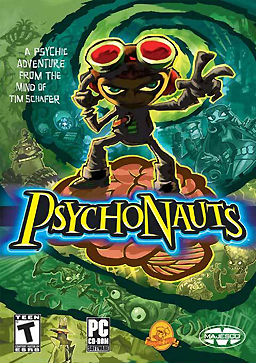They engage the enemy in his own mentality. They chase his dreams, fight his demons, and live his nightmares. They are international secret agents. They are the Psychonauts. “Psychonauts” is a 2005 platformer from the deranged and brilliant mind of Tim Schafer. It introduces the player to a world where the greatest battles and adventures take place in the mental realm and the experts in such battles are part of an elite psychic force known as the Psychonauts. The player enters the story as a young psychic boy named Raz who sneaks into a summer camp for Psycadets (Psychonauts-in-training). Players are given free reign to explore the camp and are shortly introduced to the game’s other levels: the minds of those around Raz. In “Psychonauts,” players enter the other minds to find worlds designed around the other characters’ psyches. These levels are as varied and colorful as the characters that inhabit the game. Each mind centers around a theme (the militaristic coach’s mind is a battlefield, the conspiracy nut’s brain is full of spies and subterfuge challenges, etc) but avoids the trap of being one-dimensional or too narrowly focused on a single idea. The levels are sprawling and imaginative, each with delightful and strangely detailed and insightful features inspired by the character’s mental state. The mental worlds start out fairly basic, but become more elaborate, detailed, and insane as the player makes his or her way through the game, culminating in a final level that requires multiple playthroughs or an acid trip to fully appreciate. Additionally, all mental levels contain creative collectables such as figments of imagination, mental cobwebs, emotional baggage, and mental vaults that Raz can collect to help him rank up. As players progress through the game and increase their rank, they gain new psychic abilities such as levitation, psychic blasts, telekinesis, invisibility, and the ever-popular ability to set things on fire by staring at them really hard.
The gameplay and creative level designs are not the only draws this game has to offer. The unique and hilarious cast of characters give the player reason to continually strive to explore every corner of the game’s worlds, looking for new conversations, stories, and activities. The game features a diverse set of non-player characters with memorable personalities. The dialogue is brilliantly funny and each character is well-developed enough that players will remember most, if not all, of the characters they met along Raz’s journey. These characters provide a great amount of background and atmosphere for players who like to immerse themselves in the story, but for those who prefer to blaze through to the game’s action, most of the interactions can be skipped or shortened. All of the characters have somewhat exaggerated personalities to match their cartoonish looks, but they have enough individuality and evolve enough over the course of the game to keep players invested in all of their journeys.
In short, “Psychonauts” is a wonderfully childish game that fits perfectly into the world of adulthood for those equipped with a good sense of imagination, adventure, and fun.


'Game Review: “Psychonauts”' has no comments
Be the first to comment this post!